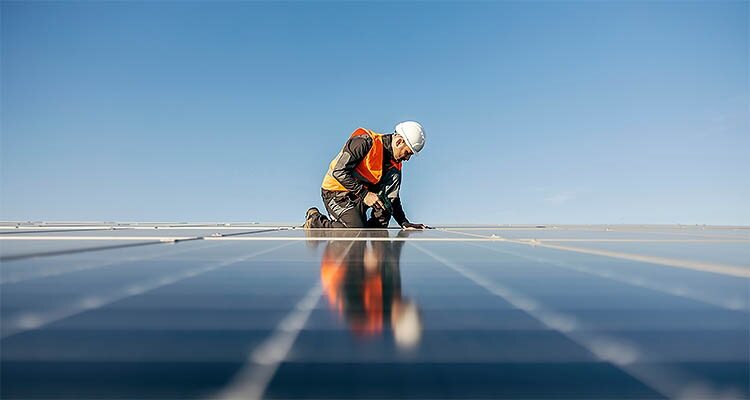
According to MiddleGround Capital the convergence of reshoring and the solar energy market represents a promising step towards a more sustainable and resilient future
American reshoring has gained momentum due to the desire for greater control and reliability. The Covid pandemic exposed the vulnerabilities of relying on distant suppliers and these fears have been further exacerbated by conflicts in Europe and the Middle East as well as increased tensions between China and the West.
By reshoring, businesses can reduce supply chain risks and ensure the availability of critical components, while creating quality jobs. An added bonus of reshoring is the ability to have greater control over quality while ensuring that safe labor practices are employed in production. At MiddleGround Capital, we invest in North American and European-based B2B industrial businesses in the lower middle market. We’re proud to encourage the growth of local manufacturers and to support the development of high-paying and safe work environments.
Impact on the solar energy market
The reshoring trend in American manufacturing is especially notable in the solar energy supply chain. The solar industry, which plays a crucial role in the transition to a more sustainable energy future, relies heavily on the production of solar panels, inverters, and essential components such as steel beams for installation. All of which are mostly manufactured overseas.
With the Biden-Harris administration’s goal of decarbonizing the power sector by 2035 and the economy by 2050, it’s more essential than ever to be able to control the supply chain. Achieving this goal requires us to more than double our solar panel installations. Meanwhile, we’ve seen massive delays and restricted supply due to issues with Chinese and Southeast Asian solar manufacturers. Many major players were under investigation for avoiding US tariffs and will begin paying additional import duties in June 2024, making solar panels more expensive. Investigators have also found that many Chinese solar products are produced using forced labor, these products have since been banned.
Despite challenges from international solar product restrictions, these disruptions present an incredible opportunity to build up the United States solar energy market. We’ve seen significant government investment in this initiative. The Biden-Harris administration announced an $82 million investment in domestic solar manufacturing, a portion of which will be dedicated to R&D to promote cheaper and more efficient manufacturing methods. Even more astounding, the EPA announced a $27 billion grant in the form of the Greenhouse Gas Reduction Fund (GGRF). This fund will finance clean energy projects and $7 billion will be solely dedicated to expanding residential solar investment to low-income communities. It’s clear that the US government is committed to supporting the development of solar manufacturing.
While the reshoring trend brings numerous advantages to the solar energy market, it is not without challenges. Companies need to carefully navigate factors such as initial investment costs, potential disruptions during the transition, and ongoing operational expenses.
American manufacturers impacted
While your first thought may be the impact on manufacturers of the panels themselves, the solar supply chain disruptions have a further-reaching impact. MiddleGround’s portfolio company Attala Steel Industries is an ideal example. We invested in Attala in December 2020, and it’s based in Mississippi. Attala is a manufacturer and distributor of steel foundation components for ground-mounted utility-scale solar PV installations; they’re known for their high-quality, low-cost materials with rapid response and delivery times.
As you can infer, alongside the increased demand for solar panels and further development of the supply chain, the need for installation tools, labor, and support solutions for utility-scale solar projects grows in parallel. Attala is well-positioned to absorb the demand and prides itself on the efficiency of its production processes, but the current landscape is challenging. Despite the government’s investment in industry and the push for decarbonization, domestic projects have experienced delays due to the lack of current domestic solar panel manufacturing capacity. This dynamic will be exacerbated when increased tariffs impact Chinese/Southeast Asian imports of solar panels in 2024. Major Engineering, Procurement, and Construction (EPC) firms will also be looking to de-source foreign supply chains as tax incentives and credits are allocated to projects with domestic content. Domestic manufacturers will be equipped to capitalize on these conditions and gain market share if capacity and production can ramp up in 2024 and onwards.
Conclusion
The reshoring trend in American manufacturing is reshaping the landscape of the solar energy market, offering a host of opportunities for growth and development. As companies bring manufacturing operations back to the United States, the solar industry stands to benefit from increased production capacity, job creation, enhanced quality control, and accelerated innovation. This convergence of reshoring and the solar energy market represents a promising step towards a more sustainable and resilient future, and we’re happy to work with companies who are pushing these trends forward.
For a list of the sources used in this article, please contact the editor.
Ryan McComb is Director, Transaction Team at MiddleGround Capital. MiddleGround Capital is a private equity firm based in Lexington, KY. MiddleGround makes control equity investments in middle market B2B industrial and specialty distribution businesses. MiddleGround creates value through a hands-on operational approach and partners with its management teams to support long-term growth strategies